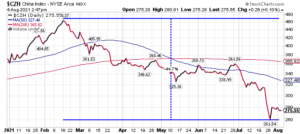A China In A Bull Shop
China has taken a number of steps of late to restrict enterprise. Press reports often phrase that there has been a “crackdown” on the private sector as if a private sector really exists in China.
In other cases, they have stepped in, as in the case of Hong Kong, to destroy freedom and the economic machine that made Hong Kong a vibrant hub of growth and innovation. As a result of these ideologically-driven steps, a number of markets have suffered some substantial sell-offs.
The result of these actions is some anomalies in world equity markets. Most stocks markets remain in strong upward trends. Not so those associated closely with China.
The FXI index of large-cap Chinese shares reached a peak in mid-April and is now down 30%, quite a bit more than the working definition of a bear market, which is considered anything greater than 20%.
China has also taken steps to restrict cryptocurrencies, something we have long predicted. GBTC representing the Grayscale Bitcoin Trust has now shed over 60% from its peak in March. We are not saying China is the only factor in this case, but it is a substantial one.
The index representing the Hong Kong Hang Seng index has dropped more than 20% since its recent peak in March.
The China Index, which trades on the NYSE Arca, is now down 46% from recent highs reached in mid-February.

In short, quite a broad measure of equity indices that reflect investments related to China, or heavily influenced by China, are suffering some substantial losses.
Perhaps the Western love affair with Chinese investments will be shaken by such events, although even stories of slave labor and genocide don’t seem to make much of dent in the enthusiasm the West has shown for China. One only has to look at American companies such as the NBA, NIKE, Disney, Apple, and Google, to see that slave labor, genocide, and the support of totalitarianism should not get in the way of making a buck.
Most investors perhaps don’t appreciate that a Chinese corporation is really quite different than a Western corporation. The People’s Army usually has representatives sitting on the board of Chinese corporations, many “corporations” are state-owned, and Chinese “capitalists” serve at the pleasure of the Chinese government. In fact, one prominent billionaire was just sentenced to 18 years in prison for speaking out. One wonders why the terms “CEO”, “corporation”, “equity”, and “markets”, even are allowed to be applied to Chinese companies.
Industry moguls such as Jack Ma, have on occasion, “disappeared” for months on end, held in government detention until “disagreements” can be worked out. Some never re-appear.
Most savvy investors don’t trust the economic numbers generated out of China anyway.
With the billions, the Chinese system is generating for the ruling class there, and the ruling class in most of the West, one wonders why they are doing what they are doing.
It would seem that maintaining tight control (ideology) is even more important than money.
Surprise, surprise, they are Communists!
We don’t pretend to be experts on all things internal to China. Their system is a strange hybrid of free enterprise on a micro level, but a Communist tyranny on a macro level. Such internal contradictions are bound to clash from time to time, and cause difficulty. The problem for all authoritarian systems is maintaining control while at the same time producing enough economic perks to keep the people subjugated reasonably content with living without their personal freedom.
When you give people their economic freedom, they just might learn to like the idea of political and religious freedom.
You might remember the theory prominent among Progressives, some Conservatives, and many libertarians, that trade with China would moderate their behavior. They would become more like us. That has not occurred.
In addition, they argued that increased commercial ties, guard against the chance of conflict because each party has too much to lose. That has never been the case. Those that assert that simply don’t know their history.
For example, before World War I, both Russia and Britain were huge trading partners with Germany, and Germany was a huge trading partner with them. In addition, the heads of the three countries were closely related by blood, they were cousins. They still went to war with each other.
Whatever is going on in China, it should serve as a warning to investors not to assume that business and finance terms, used by the press, represents the reality of the risks of investing in China. It is vain of the West to think we can apply common business terminology and apply it to China and think it actually describes the way they operate. You may wish to call a dragon and cow if you want, but reality says it’s still a dragon.
In China, one has all the normal risks of the cyclical nature of earnings, interest rates, currencies, and price fluctuations. But in China, you also have significant political risk. It is not just corruption, it is an ideology that does not respect your life or your property. And, the government does not want anyone or any company to challenge their authority.
A government that can forcibly sterilize women to destroy a culture, and use slave labor, is not likely to have much compunction about screwing you out of your money.
Maybe their brutal regime will look a bit different after investors have lost a lot of their money.
*****
Chart courtesy of stockcharts.com

